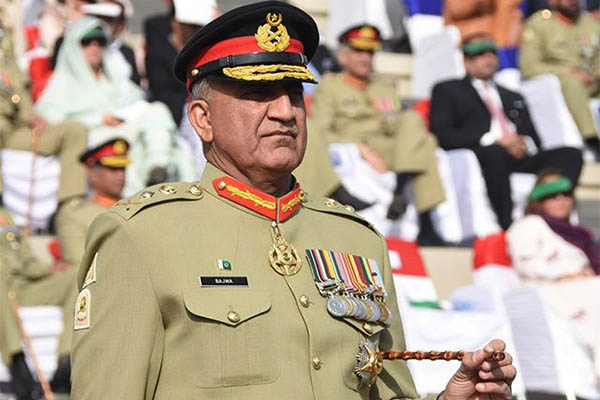
Courtesy ISPR
In its petition, government seeks ‘in-camera’ proceedings and claims ruling did not consider ‘important constitutional and legal’ points
The Pakistan Tehreek-e-Insaf-led government on Thursday filed a review petition against the Supreme Court judgment that had directed fresh legislation, within six months, to extend the tenure of Pakistan Army chief Gen. Qamar Javed Bajwa.
In its petition, the government has urged the court to form a larger bench to hear its review plea. It has also requested the proceedings to be kept secret—‘in camera’—likely raising concerns from rights activists over attempts to intimidate the judiciary into accepting the government’s demands.
The petition claims the verdict issued by a three-member bench of the Supreme Court did not consider “important constitutional and legal” points, adding that the top court had itself given “extensions to additional and ad-hoc judges,” which were not used as precedent to secure Bajwa’s extension.
Addressing a press conference, Special Assistant to the P.M. on Information Firdous Ashiq Awan said the review petition was filed because “our legal team thoroughly, comprehensively, and closely reviewed all aspects of the decision and concluded that there are several legal gaps in the verdict.” She said Law Minister Farogh Naseem—who had resigned from office to represent Gen. Bajwa during the Supreme Court trial—would address the media directly later to offer greater details.
Under the law, the government had to file a review petition by Dec. 28 after the top court announced its ruling in a short order on Nov. 28.
The petition, submitted by Attorney General Anwar Mansoor Khan, criticizes the legal aspects of the judgment authored by then-Chief Justice of Pakistan Asif Saeed Khosa. “The impugned judgment is bad in law and facts. The same is completely without jurisdiction, void ab initio and of no legal effect,” it says, adding the court “completely overlooked” laws laid out in the Constitution. “It is respectfully pointed out that glaring omissions and patent mistakes have crept into the impugned judgment, violating the law and the Constitution.”
According to the petition, it has been filed “in the interest of public good.” It also notes “seminars and processions in favor of Gen. Bajwa’s re-appointment, from which the pulse of the public opinion can be appreciated.” It claims Gen. Bajwa “himself never sought a re-appointment”—a dubious assertion considering the government has admitted—on several occasions—that the Army chief personally met government officials, including P.M. Imran Khan, to try and overcome the court’s objections to his extension prior to the ruling.
The petition goes on to claim this was a case where the “court ought not to have interfered.” It harkens back to the very judgment it is questioning by claiming that the court has decided the chosen representatives should decide matters pertaining to appointment and extension of the Army chief. “This means that the appointment has to be made through the chosen representatives, who have left the matter to be dealt by conventions by not legislating for 7 decades and there is nothing wrong with this,” it adds.
In its order, the Supreme Court had allowed the federal government to grant a six-month extension to Gen. Qamar Javed Bajwa, saying that all existing laws fell “deficient of the structural requirements for raising and maintaining an Army under clause (3) of Article 243 of the Constitution.” It said that “no tenure or age of retirement for the rank of General is provided under the law,” adding the institutional practice of a general retiring after three years was not a “valid substitute of the law.”
The verdict said that in light of the attorney general’s assurances that new legislation would be enacted to overcome the legal lacunae, as well as the importance of the responsibilities of the COAS, it was appropriate that the incumbent Army chief could continue for a period of six months. However, the ruling warned, if no legislation were forthcoming within six months, Gen. Bajwa would stand retired and the government would have to appoint a new Army chief.
“We are showing judicial restraint although there is no provision in law to grant an extension,” said Chief Justice Asif Saeed Khosa in the ruling. “We leave this matter to Parliament to make law regarding this.”

2 comments
Pakistan army zindabad
Why file such appeal when a simple decree from the GHQ could do the trick. The strings wielded from Pindi are naked and visible